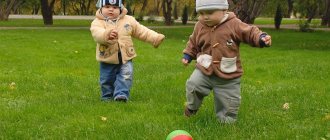Parents surround their children with love and spend time together. Talk to them and discipline them. At the same time, they think that this way they can direct the child towards the right direction of development. Yes it is. How parents influence the formation of a child's personality.
But the deep basis for the formation of a child’s personality is not always determined by methods of upbringing. The main factors are the personal qualities of the parents themselves. They directly influence how the child perceives himself. Regardless of whether the parents themselves want it.
The child’s individuality is formed largely based on the worldview of the parents. Their manners and attitude towards the world around them. Each parent has a certain “baggage” of experience inherited from their ancestors. Which was replenished throughout life.
Every parent involuntarily influences their child, both beneficially and not so much. Therefore, it will be useful for them to find out how they can influence their child. And, if possible, correct the moments that they would not like to pass on to their children.
As a rule, the mother becomes the first source of life experience for the baby. If the mother surrounds the child with warmth and care, then he will develop holistically. Otherwise, developmental disorders and subsequent psychological problems and pressures often appear.
Photos from pictures yandex.ru
The father's role is to help establish connections with the world outside the mother's embrace. Dad teaches the child to interact with the world and demonstrates possible methods for this, and engages in various activities with him.
If dad is calm, able to captivate and interest the child in the world outside the safety zone that mom creates, then it will be easier for the child to adapt in the future. The world will not be perceived as hostile to them.
And on the contrary, if the father has difficulties in communicating with the outside world, then there is a high probability that the child will carry this approach into his life.
It is not uncommon that even the most sensitive parents pass on some of their negative traits to their child without even knowing it.
The following examples are common:
Excessive interest in the child's life
Living in an atmosphere of excessive attention to oneself, the child becomes overly secretive. And subsequently it becomes a habit for him.
This trait may not play the best role in later life when trying to establish romantic or friendly relationships. A person will suddenly realize that he is simply unable to share his deep feelings with others.
Constant excessive criticism of the child
Parents believe that they are doing this for good purposes. For the sake of raising your child. They do not always notice that the consequence of this approach is the child’s excessive passivity. The child simply loses the point of doing anything so as not to be judged again.
Photos from pictures yandex.ru
The house where the parents could not find a common language
The kid grew up in a home where his parents love him. But here he did not see the love between the parents themselves. Such a child often grows up unsure of himself. There is no internal feeling of safety and integrity.
Overly anxious parents
Children of this type of parent usually grow up to be very nervous. They simply cannot relax because of the energy of their parents.
Excessive parental care
An atmosphere of excessive care can contribute to the development of depression in a child.
As can be seen from the examples above, in the relationship between parents and their child, personal problems of the parents themselves can be revealed. This can further seriously affect the child’s consciousness as he grows up.
Often, children in adulthood begin to copy even their parents’ approaches to education, although they themselves often do not even realize this. There are endless examples of this in real life.
You can talk endlessly about how we are not like our parents, that we are different, but it’s not for nothing that there is a phrase: “If you want to see your wife (spouse) in old age, look at your mother (father).”
The child's place in the family
We have already found out what a family is and who belongs to it. What position does the child occupy in it? In the system of family relations, a child is the weakest link; he is small, poorly adapted to anything and needs protection and care. Clothe, feed, warm and protect - these are the basic parental instincts.
At the same time, he has neither knowledge, nor skills, nor experience, so he is taught. They teach everything they know and know. Children are very susceptible to their environment, so they copy many elements of the character, behavior, and reactions of adult family members, like little monkeys.
Important
The family is a fundamental link in the life and development of children. It is she who has the greatest influence on their formation and development as individuals.
General desire and everyday patterns
Doesn't every parent want their child to be successful in life, preferably from the first days? And it seems that this is a completely reasonable desire.
However, most mothers expect their children to keep things in order from the very beginning, especially in their rooms. But if you think about it, who can count on a “decent” child?
A parent who often searches for documents or items lost in the chaos. Or a well-organized parent who always has everything in order and in its place?
Photos from pictures yandex.ru
It is probably obvious to the vast majority of readers that the second parent has a better chance of having their child keep order.
However, it's not just about the example. To accustom a child to order, it is necessary that the child himself first of all recognizes the benefits of such behavior.
Parents are the most easily accessible model of behavior. Therefore, it is very important to be aware of this influence when meeting certain requirements or expectations.
Children, like adults, learn through observation. But, unlike adults, they do not question what they see. They just imitate them.
How does this relate to coaching and all the skills and characteristics mentioned at the beginning? It's simple!
It's difficult to raise a child who cares about order to a parent who doesn't. Likewise, raising a calm and emotionally stable child will be difficult for a parent who is easily subject to angry outbursts or crying.
Parental example: how parents influence the formation of a child’s personality
Who should learn - the child or the parent? Both! Parents who want their children to listen to them must learn to actively listen to their children themselves. Talk to them, learn to devote your time and attention to conversation. So that children believe in themselves and strengthen their self-esteem.
It's hard to imagine coaching with a two-year-old. But if the parent develops all the characteristics and skills. Which he expects from his child from the first days of her life, he can teach her models to follow.
During the so-called parent training, you can not only develop life skills. In them, the parent wants to appear as an example for the child. But also learn to initiate and strengthen the desired qualities.
How to behave so as not to traumatize the psyche of children
A normal, healthy environment in the family also has its signs. Let's look at what an ideal family looks like.
There is a reasonable attachment between parents and children.- From an early age, the child develops communication skills. He is able to ask and explain, you can negotiate with him.
- Parents jointly care for their children, which makes them feel cared for by each parent.
- Understanding the characteristics of child development.
- Age-appropriate sex education that does not conflict with morals and the constitution.
- Sufficient amount of attention that children receive.
- Adequate assessment of the child’s capabilities, absence of unbearable demands and burdens.
- Help and support children in their endeavors.
- Reasonable family financial planning, introducing children to the basics of planning.
- Teaching children home chores according to their age. There is no need to demand what is impossible. A 2-year-old child can already wash apples, and a 3-year-old can help his mother get spoons for dinner; at 5 years old, children can be introduced to a vacuum cleaner, etc.
In general, nothing difficult or impossible. Most parents are familiar with these points and practice them. There may be small inconsistencies in life because we are all human. There may be infrequent quarrels and misunderstandings. But raising a child to be a good, successful person is what we all strive for. And all a child needs is an adequate, loving family.
Besides
You can stimulate the child's development. His creativity, independence and resourcefulness through various coaching tools.
For some of them, it will certainly be useful to learn how to ask questions. Encourage your child to find a solution on their own. Instead of offering him ready-made answers “on a tray.”
Others may find it most valuable to develop their child's self-confidence by building on their strengths. Through mentoring sessions, a parent learns to become a mentor to their child.
This does not mean that a parent should constantly act as a mentor. Sometimes it is important to just hug your child and support. Instead of asking how he can cope with his emotions.
Thanks to the acquired skills, the parent can take on the role of a mentor at those moments when the child needs it.
House without foundation
Is baby training just an unnecessary fad? Is parent training another form of activity for modern parents?
How much easier it would be for people at school, at work, in everyday life. If only resilience and faith in themselves and their own abilities were created in them in early childhood.
If they learned to recognize, accept and regulate their own emotions, engage in valuable relationships, plan and organize?
Now is the time when you can build modular houses without a foundation. They are built quickly and can be placed almost anywhere.
Their durability, equal to brick houses, largely depends on the quality of materials and workmanship. An error of a few millimeters and the stability of the building becomes questionable.
Features and skills related to managing emotions, relationships, and self-esteem can also be considered the foundations of child development.
If parents take care of shaping them from the first days, months and years. Then crises, stress and unpleasant experiences will not disturb the child’s psyche too much.
Thanks to high mental resilience, it will be easier for the child to understand, accept and cope with the events that have occurred. It's like a solid foundation for a house.
Without this stable base, with any difficult experience, with any mistake, the child’s endurance can be reduced. And make the problems more burdensome. This does not mean that they will be impossible to overcome.
A breakup in a relationship or minor career difficulties may later leave only harmless cracks in the walls. And without a solid foundation, they can destroy most of the house.
So we don't get tracked
One evening, without turning on the light, her mother told five-year-old Daria that they wanted to kill them. The woman called her new neighbor a witch and believed that enemies could break into the apartment at any moment. Fleeing from ill-wishers, the family moved twice until they finally locked themselves at home. The grandmother brought food, and they lived on her pension and alimony from Daria’s father.
From the age of five to 13, the girl was locked up. She was not sent to school, and all her education boiled down to “working through textbooks from cover to cover.” “I still don’t understand why none of the relatives paid attention to this,” said Daria Trofimova from Moscow. — Subsequently, I talked to them about this topic, but they shifted the responsibility onto each other. They said: “We thought my father should have done this. We thought grandma should have done this. We thought your aunt should have done it.” In general, it’s a vicious circle.”
The girl’s mother explained all the illnesses by saying that they were irradiated with a laser. Some part of the body was damaged, and that’s why it hurts. So Daria suffered from otitis media at home. They took her to the clinic only once, after which her mother said that they shouldn’t have done it. After all, now the enemies know their exact location! From now on I definitely won’t step foot outside. The apartment, according to the mother, was also bugged, so they spoke in a whisper so that the neighbors would not find out the content of the conversations.
When Daria was 13, she had to run away again. On a winter night, he and his mother packed their things, wrapped themselves up tightly (so that their faces were not visible) and went to the Moscow region, to their grandmother. They spent the next year and a half there, during which Daria began to be released onto the streets. She began to communicate with the neighboring girls, even inviting them to visit. They found out that Daria does not go to school and her mother does not work. Hints and giggles began, incomprehensible to the girl.
“One day my aunt asked: “Don’t you understand that your mother is mentally ill?” I was very offended by her then, but a year later my mother’s aggression was directed at me. She said: “You conspired with people who want to kill us, you betrayed me.” Regular beatings began. And at some point I was afraid that she would simply kill me, because she punched me in the face in the middle of the night. Grandma knew what was happening and told me to be patient. I waited a few more months and about a month before my 16th birthday I ran away,” Daria shared.
She went to her grandfather in Moscow, where three months later other relatives found her. Daria was finally sent to school, and after the ninth grade she entered college on her own. During this time, her mother visited a mental hospital twice and was diagnosed with paranoid schizophrenia. After the next discharge, the woman hanged herself. Daria was in shock from this news, and, according to her, for the next 12 years she worried about what happened.
After a long life locked up, the girl almost did not know how to communicate. In all groups, she kept herself apart and did not understand how to establish close relationships. And at the age of 24, severe depression began, and Daria still takes medication: she was diagnosed with anxiety-depressive disorder. Daria is working through her traumatic experience in psychotherapy and believes that many questions still remain.
“I changed a bunch of meaningless jobs and only at the age of 30 I realized what I wanted to do (now the heroine is 34. - Note TD). I am sure that it was my mother’s illness that provoked my interest in people’s psychological problems. But in general, I live quite well with this background. I was able to graduate on my own, enroll in higher education and work. Probably, everything is not as bad as it could be,” Daria said. Now she is studying to become a psychologist herself.
Photo: Adam Winger / Unsplash.com
Necessary training
Are all parents or couples preparing for the birth of a child in a hurry to go to trainers? To work hard on yourself? To ensure the success and happiness of your children in the future?
No. Not everyone needs this; some couples have enough skills and psychological preparation to teach their child. However, if there are feelings or confusion about the correctness of your behavior with the child.
If difficulties arise in self-education, then it is better to turn to the mental foundations of parental education. It is very likely that not only the child, but also the parent will benefit from this.
Exchange of positive emotions on the article: How parents influence the formation of a child’s personality. I give you a blessing, and you go through the stars!
- Your life experience: how to prepare your child for adulthood
- Moral choices or life values of a child
What is family
Psychologists define a family as a group of interacting people who are united by marital relationships and family ties. Families may differ in the number of members and structure, but they all have one task - mutual assistance in the comprehensive development of each family member.
United by common housing, everyday life, budget, family ties and family values, people become a single group. The family includes the husband, wife and their children. All other relatives remain close and dear, but as if at a distance.










